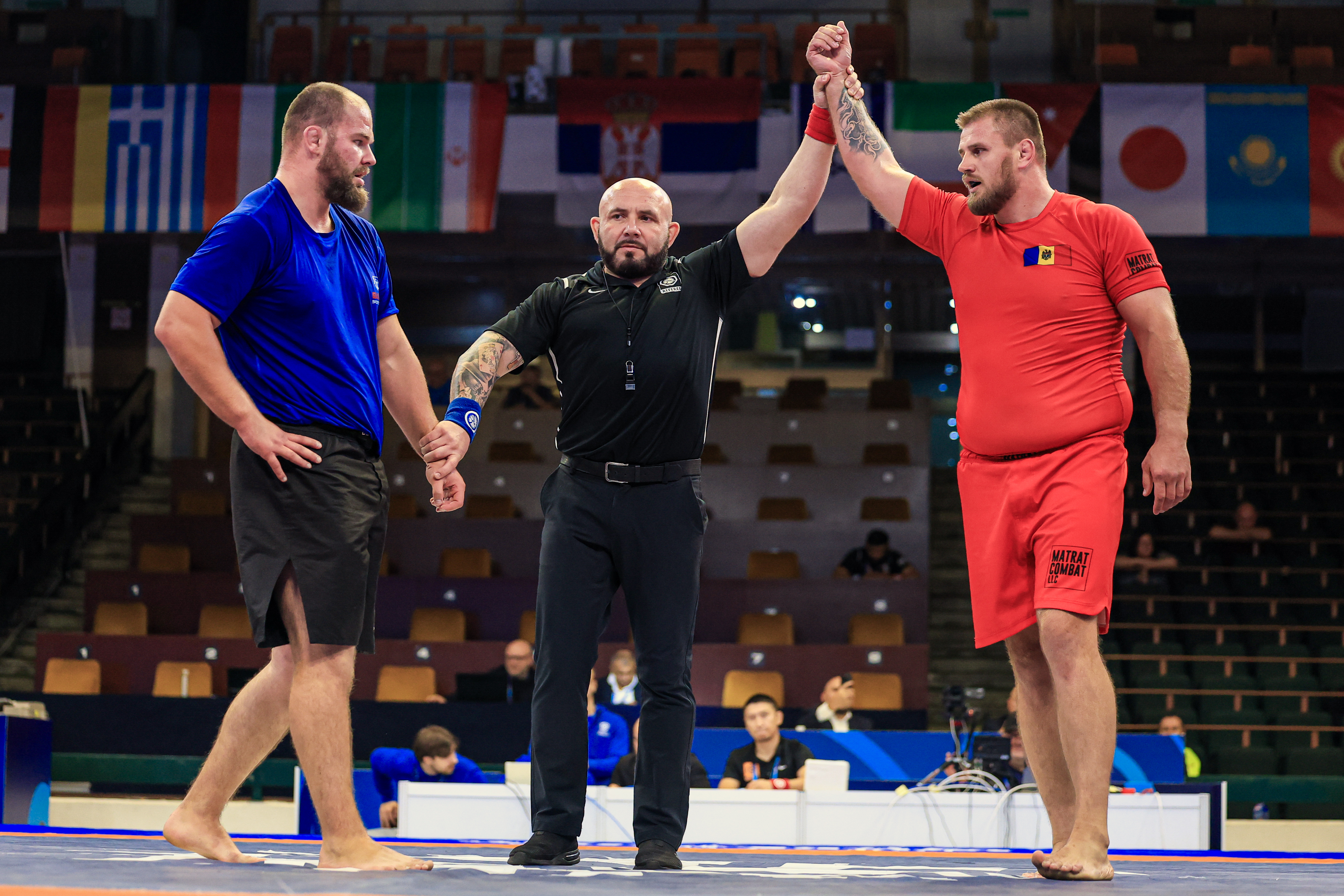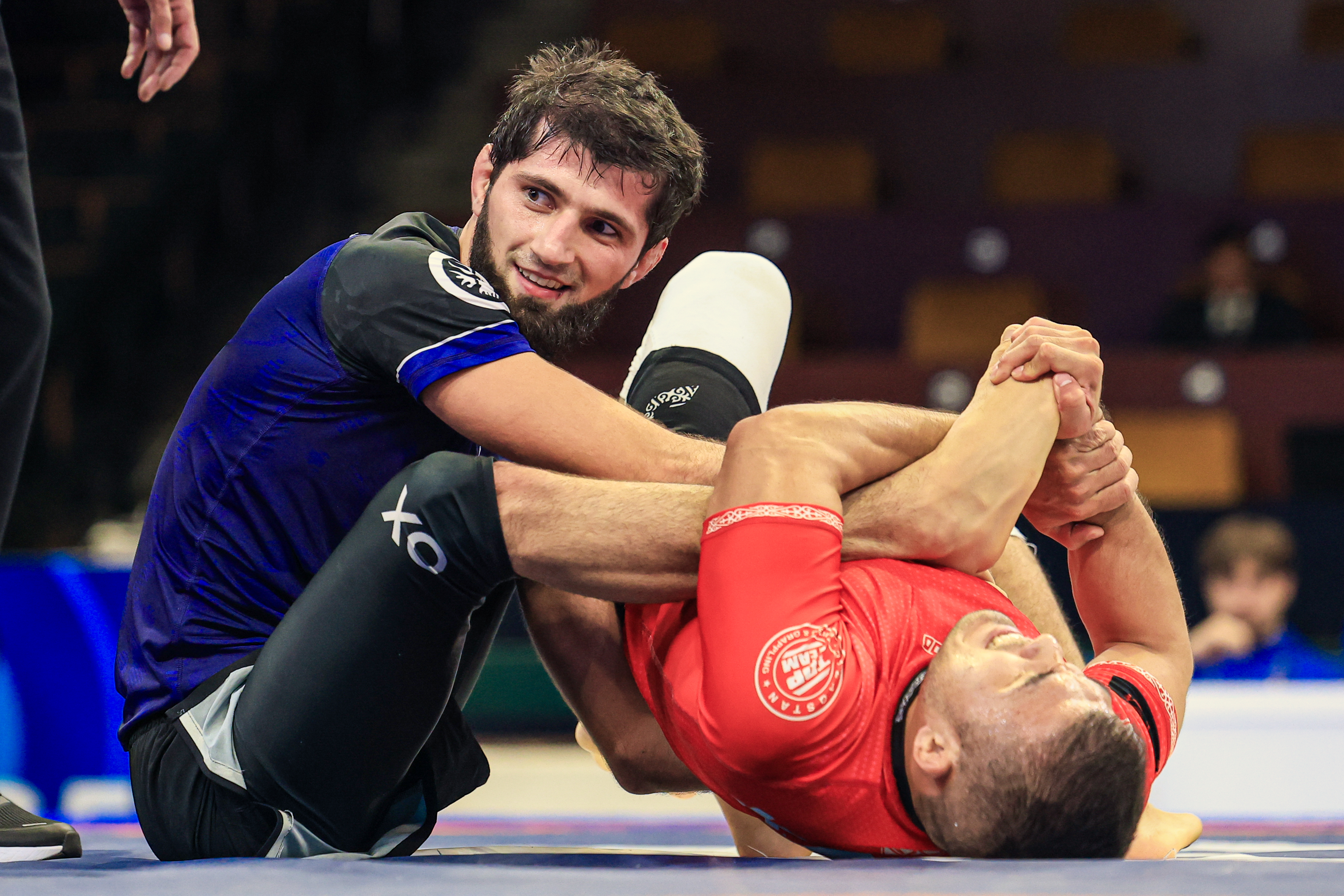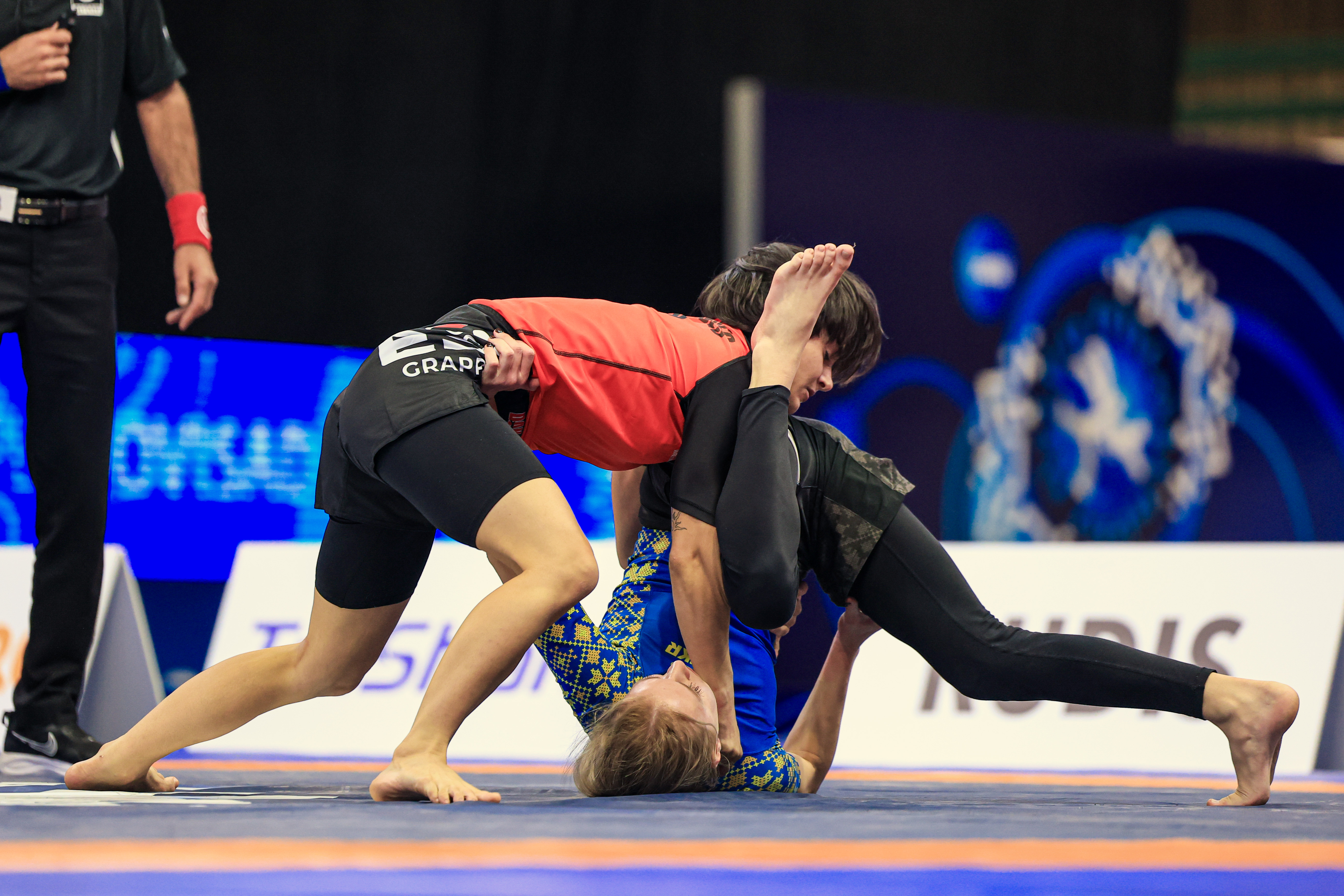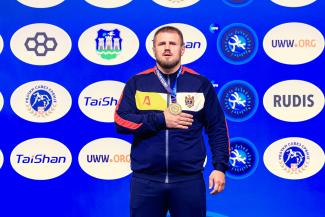NOVI SAD, Serbia (October 14) -- When the last time Alexandr ROMANOV (MDA) participated in the World Grappling Championships, he was close to completing a double gold in Gi and No-Gi. While he managed to win gold in Gi, Romanov fell short in No-Gi competition and won a bronze medal.
Three years later, the Moldovan has taken the first step towards achieving his dream. On Tuesday, Romanov had a comeback in the World Grappling Championships in Novi Sad, Serbia and won gold in the No-Gi competition at 130kg.
Romanov was in top form winning two bouts via submission and two, including the final, via decision but dominated his opponents to win gold medal.
 Alexandr ROMANOV (MDA), red, defeated Aleksander KOLDOVSKI (UKR) in the 130kg final. (Photo: United World Wrestling / Amirreza Aliasgari)
Alexandr ROMANOV (MDA), red, defeated Aleksander KOLDOVSKI (UKR) in the 130kg final. (Photo: United World Wrestling / Amirreza Aliasgari)
Up against Aleksander KOLDOVSKI (UKR), Romanov stuck to his plan and started off slow. But as Koldovski slowed down after two minutes during the five-minute bout, Romanov hit a footsweep to score two points and controlled his opponent for three more points. Another control gave him two more points as he defeated Koldovski a 7-1 victory.
"I knew the Ukrainian as he is a freestyle wrestler," Romanov said. "I waited for the second half of the bout as they tend to slow down and I hit my favorite move to win."
In other finals, UWW grapplers dominated the finals, winning four golds while Farhad BAGIROV (AZE) defended his 58kg gold medal. In women's competition, Carlota PRENDES LARIOS (ESP) also defended his 53kg gold medal while Alycia QUENEE (FRA) won at 71kg. Alena VLASOVA (UWW) won her two bouts to claim the 90kg gold as the weight class had only three participants.
Bagirov maintained his control in the final by using a rear chokehold on Zedginidze who tried escaping a couple of time. But at the two-minute mark of the final, Zedginidze tapped out to give Bagirov his second successive gold medal at 58kg.
 Kurban KADIEV (UWW) won the 71kg gold medal in Novi Sad. (Photo: United World Wrestling / Amirreza Aliasgari)
Kurban KADIEV (UWW) won the 71kg gold medal in Novi Sad. (Photo: United World Wrestling / Amirreza Aliasgari)
At 71kg, Kurban KADIEV (UWW) and Nurbek TALBUDIN (KAZ) failed to score any points in the regular five minutes and the final continued in overtime. Due to no technical points scored, a toss was needed to decide who will get the advantageous position. Talbudin won the toss to be on top and needed to score minimum one point in the designated one minute to win the match. However, Kadiev managed to defend his position for one minute to be declared winner.
In contrast, the 77kg final between Gazimagomed GAZIEV (UWW) and Illia SUKHODIEIEV (UKR) ended in just 36 seconds as the former caught Sukhodieiev in a triangle choke to win the final.
Murad ABDULATIPOV (UWW), who was moving up from 84kg to 92kg for this year, did not feel as weight of the jumping up a weight class and defeated Islam TAPPASKHANOV (UWW), 2-0, in the 92kg final to win his second straight gold medal.
Both the points for Abdulatipov were awarded when Tappaskhanov was called passive in the five-minute bout and he failed to score during the 15-second activity clock.
At 100kg, Mukhamed URUSOV (UWW) blanked Aleksandre TEVZADZE (GEO), 4-0, to win his first world title. He earned his first two points after a back-mount position after a scramble and later scored another similar takedown for two more points.
 Carlota PRENDES LARIOS (ESP) grapples in the 53kg final that she won. (Photo: United World Wrestling / Amirreza Aliasgari)
Carlota PRENDES LARIOS (ESP) grapples in the 53kg final that she won. (Photo: United World Wrestling / Amirreza Aliasgari)
Prendes Larios repeats
Carlota PRENDES LARIOS (ESP) won two of three bouts, including the final, via submission to capture her second straight world title at 53kg. She began by controlling Viktoriia ISAIEVA (UKR) right off the whistle for two points before scrambling herself in a triangle choke position which gave her two more points.
Isaieva tried defended different position but after a couple of failed attempts to get out of the triangle choke, she tapped with Prendes Larios winning the bout in one minute and 56 seconds.
In a thrilling 71kg final, Alycia QUENEE (FRA) managed to capture her first world title after beating Anna REMNEVA (UWW), 3-1. Quenee finished with a silver medal in 2022 and bronze last year.
But there was no one stopping Quenee this year. She began the final with a stepout and took a 1-0 lead. Remneva tried to control her with a triangle hold but Quenee never came in a position to gave up points.
The French grappler kept her position and controlled Remneva on the mat for two points, extending her lead to 3-0. During the same position, Quenee was called passive and she gave a point but that did not stop her from winning 3-1.
At 90kg, Alena VLASOVA (UWW) upgraded her bronze from last year to gold after winning both her bouts via submission. She defeated Tatiana KABANOVA (UWW) in the first bout and then submitted Justyna SITKO (POL).
RESULTS
Men's Grappling
58kg
GOLD: Farhad BAGIROV (AZE) df. Daviti ZEDGINIDZE (GEO), via submission (6-0)
BRONZE: Bohdan CHORNEI (UKR) df. Jaden SOSA (USA), via submission (0-2)
BRONZE: Alikhan ALSHINBAY (KAZ) df. Razmik MISAKYAN (ARM), 8-2
71kg
GOLD: Kurban KADIEV (UWW) df. Nurbek TALBUDIN (KAZ), overtime (0-0)
BRONZE: Apandi AMAGAEV (UWW) df. Zhassulan ZHETPISBAY (KAZ), via submission
BRONZE: Dzhimsher RAZMADZE (GEO) df. Nico PULVERMUELLER (GER), 2-0
77kg
GOLD: Gazimagomed GAZIEV (UWW) df. Illia SUKHODIEIEV (UKR), via submission
BRONZE: Sam SCHWARTZAPFEL (USA) df. Angelos NIKOLOPOULOS (GRE), 10-2
BRONZE: Magomed IBRAGIMOV (UWW) df. Dumitru CEBAN (MDA), 2-1
92kg
GOLD: Murad ABDULATIPOV (UWW) df. Islam TAPPASKHANOV (UWW), 2-0
BRONZE: Anthony ROBINSON (USA) df. Reda MEBTOUCHE (FRA), via submission (1-2)
BRONZE: Mateusz MAZUR (POL) df. Antonio SALTUPS CARETTO (ITA), 4-2
100kg
GOLD: Mukhamed URUSOV (UWW) df. Aleksandre TEVZADZE (GEO), 4-0
BRONZE: Saba DJAVAKHICHVILI (FRA) df. Khasan ZAPIROV (UWW), 1-0
BRONZE: Eldar RAFIGAEV (MDA) df. Herve REDON (FRA), via submission (0-2)
130kg
GOLD: Alexandr ROMANOV (MDA) df. Aleksander KOLDOVSKI (UKR), 7-1
BRONZE: Umar GAISUMOV (UWW) df. Abraham COBY MARTINEZ (ESP), via submission (2-0)
BRONZE: Nikita LOBOIKO (UWW) df. Nizami GAFAROV (AZE), 5-1
Women's Grappling
53kg
GOLD: Carlota PRENDES LARIOS (ESP) df. Viktoriia ISAIEVA (UKR), via submission (4-0)
BRONZE: Evelina FLORIAK (UKR) df. Giulia ANGIOLINI (ITA), via submission (0-3)
BRONZE: Anorbi GRISHINA (UWW) df. Valeriia SHUVALOVA (UWW), 2-2
71kg
GOLD: Alycia QUENEE (FRA) df. Anna REMNEVA (UWW), 3-1
BRONZE: Maja SALAMON (POL) df. Daniella SANTANA FABELO (ESP), 13-4
BRONZE: Valentina PAVLOVA (UWW) df. Anna KOTIUK (UKR), 4-1
90kg
GOLD: Alena VLASOVA (UWW)
SILVER: Tatiana KABANOVA (UWW)
BRONZE: Justyna SITKO (POL)




 Alexandr ROMANOV (MDA), red, defeated Aleksander KOLDOVSKI (UKR) in the 130kg final. (Photo: United World Wrestling / Amirreza Aliasgari)
Alexandr ROMANOV (MDA), red, defeated Aleksander KOLDOVSKI (UKR) in the 130kg final. (Photo: United World Wrestling / Amirreza Aliasgari) Kurban KADIEV (UWW) won the 71kg gold medal in Novi Sad. (Photo: United World Wrestling / Amirreza Aliasgari)
Kurban KADIEV (UWW) won the 71kg gold medal in Novi Sad. (Photo: United World Wrestling / Amirreza Aliasgari) Carlota PRENDES LARIOS (ESP) grapples in the 53kg final that she won. (Photo: United World Wrestling / Amirreza Aliasgari)
Carlota PRENDES LARIOS (ESP) grapples in the 53kg final that she won. (Photo: United World Wrestling / Amirreza Aliasgari)
Share your thoughts.
Comments